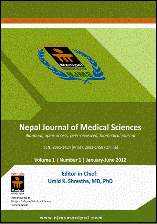Old and New Players in Oral Antiplatelet Therapy in Treatment of Acute Coronary Syndrome
DOI:
https://doi.org/10.3126/njms.v1i1.5799Keywords:
Acute Coronary Syndrome, antiplatelet therapy, thienopyridinesAbstract
Oral antiplatelet therapy plays an important role in treating patients with acute coronary syndrome (ACS), including patients with unstable angina (UA), non-ST segment elevation myocardial infarction (NSTEMI) and patients with ST-segment elevation myocardial infarction (STEMI). All antiplatelet drugs in addition to inhibiting acute arterial thrombosis have danger of interfering with the physiologic role of platelet hemostasis. Bleeding is a major factor in evaluating the utility of available and upcoming antiplatelet drugs and their combination regimes. The role of anti platelet agents in the treatment of ACS has undergone significant changes over the past several years. Aspirin, thienopyridines, and glycoprotein (GP) IIb/IIIa inhibitors are now standard parts of the treatment of STEMI, NSTEMI and UA whether an early invasive or an initial conservative strategy is chosen. Antiplatelet drugs have an important role in secondary prevention in the patients of ischaemic heart disease.
Keywords: Acute Coronary Syndrome; antiplatelet therapy; thienopyridines.
DOI: http://dx.doi.org/10.3126/njms.v1i1.5799
Nepal Journal of Medical Sciences. 2012; 1(1): 49-55
Downloads
Downloads
How to Cite
Issue
Section
License
Copyright © by Nepal Journal of Medical Sciences. The ideas and opinions expressed by authors of articles summarized, quoted, or published in full text in this Journal represents only opinions of authors and do not necessarily reflect the official policy of Nepal Journal of Medical Sciences or the institute with which the author(s) is (are) affiliated, unless so specified.




